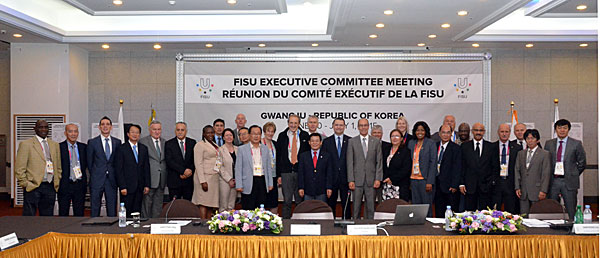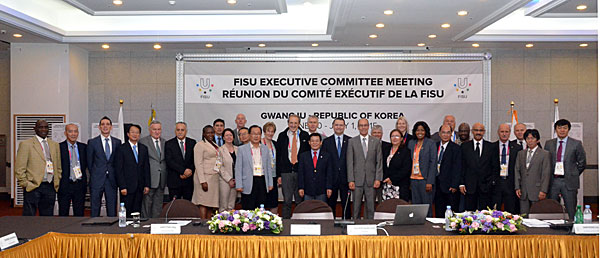
GWANGJU – As a prelude to the opening of the 28th Universiade in Gwangju, the FISU Executive Committee began today 30 July, its two-day’s session. The agenda of the meeting was quite dense and it was opened by Mr. Yoon Janghyun, the Mayor of Gwangju and Co-Chairman of the Organizing Committee of the Universiade. He thanked the FISU representatives for their presence in Gwangju and assured them of the full support of the Organising Committee for the realisation of the Project ‘EPIC Universiade’.
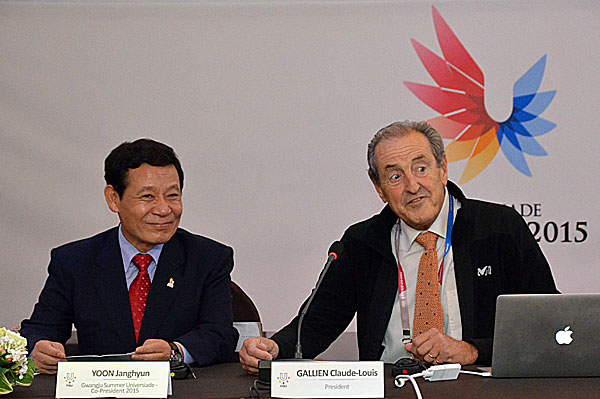 Mr. Janghyun Yoon, the Mayor of Gwangju with Claude-Louis Gallien (right), the FISU President
Mr. Janghyun Yoon, the Mayor of Gwangju with Claude-Louis Gallien (right), the FISU President
FISU President Claude-Louis Gallien was the first to present his report. He recalled the importance of flexibility of FISU as it allowed the organisation to successfully host the 27th Winter Universiade 2015 on two different sites and in two countries, Spain and Slovakia. He also highlighted the upcoming 28th Gwangju Universiade as one of the best Summer Universiades in the history of the FISU World University Games. The President then reviewed the future events of FISU and the need to organise different and innovative events like the ‘University Basketball 3×3 League’ or ‘Lausanne in Motion’ (for the creation of an ‘International University Sport Day’) which are very important for the future of FISU.
He also opened the door for the possibility of introducing competitions for disabled student-athletes and events involving athletes from school sport in close collaboration with the International School Sport Federation. Finally, the President ended his report with the final changes in statutes and internal regulations which are the result of the major overhaul that started four years ago.
FISU Treasurer Bayasgalan Danzandorj presented an assessment of the financial situation recalling the fragility of the current times, still impacted by the global financial crisis. Efforts are still needed therefore to minimize expenses.
FISU Secretary-General/CEO Eric Saintrond then returned to the daily management of the organisation and the preparation of the 28th Universiade Gwangju. He reminded the volume of work provided by the FISU staff during the months prior to the Universiade and the various problems solved thanks to the very good collaboration with the GUOC. He then gave an update of the future FISU events. He finally passed the floor to Jean-François Sauterau, the President of the French Federation of University Sport (FFSU) who was mandated by the FISU EC to study the possibility of including disabled athletes in FISU events. In the conclusions of his report, Mr. Sautereau called for the inclusion of disabled people in the FISU competitions and non-sporting events. This action will have to be with the agreement and in collaboration with the existing international sports bodies dealing with this matter.
The FISU President underlined that this inclusion should indeed be studied as it is an asset to FISU and it fits completely with FISU’s educational mission.
Then, the floor was given to the delegates of the Gwangju Universiade Organizing Committee to give a detailed progress report of the 28th Universiade, which will begin on 3 July. Under the direction of Mr. Kim Hwang-sik, President of GUOC, all aspects of the organisation were discussed, especially those related to the practical aspects of the Opening Ceremony.
After four days of accreditation, 1,462 athletes and 795 officials from 41 countries are already present in Gwangju. The FISU President thanked the President of GUOC for his presentation and wished him good luck with the hosting of the Games.
 Jung Kiyoung (right), Director of the International Affairs of the GUOC presenting the 2015 FISU Conference in Gwangju together with Arnaud Richard, presenting the FISU Forum 2016 in Montpellier
Jung Kiyoung (right), Director of the International Affairs of the GUOC presenting the 2015 FISU Conference in Gwangju together with Arnaud Richard, presenting the FISU Forum 2016 in Montpellier
Alison Odell, First Assessor and Chair of the Education Services Committee then took the floor to present the work of her Committee and presented a progress report regarding the preparation of the future events in the field of education, i.e. the Conference, the 2016 Forum and the 2018 Forum. The FISU Conference which begins on 11 July at Honam University will tackle the topic “The impact of University Sport in the Global Community”. The Conference will be open to all Universiade accredited persons and promises to be a big success. The preparation of the 2016 Forum is now on track and Arnaud Richard, Chair of the Local Organising Committee, presented the event to be held in Montpellier, France in July 2016. Finally, the Executive Committee has appointed Krasnoyarsk (RUS) as the next city where the Forum will take place in 2018.
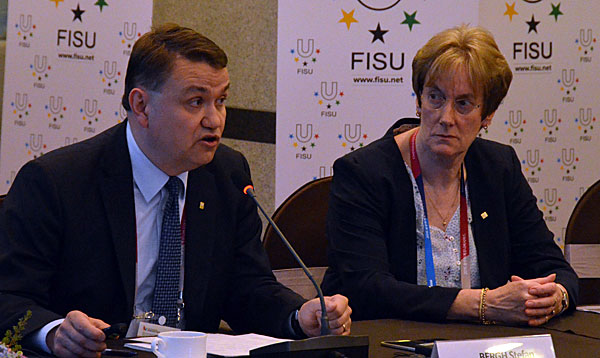 Stefan Bergh, Chair of the CDSU and Alison Odell, Chair of the EDUC committee
Stefan Bergh, Chair of the CDSU and Alison Odell, Chair of the EDUC committee
Stefan Bergh, Chair of the Committee for University Sports Development presented the report of his Committee regarding the budgets for Continental Associations as well as the NUSF projects partially funded by FISU. He also presented the Financial Aid Programme for NUSFs to send athletes to the Universiade. For this Universiade, 52 countries will benefit from the programme. Finally, Mr. Bergh presented the associations applying to join FISU. These requests will be considered at the next General Assembly. FISU should reach and possibly exceed the number of 170 member associations at this occasion.
Rosaura Mendez, Chair of the Committee for Gender Equality presented the next edition of the FISU Round Table for Gender Equality to be held in Gwangju on 10 July.
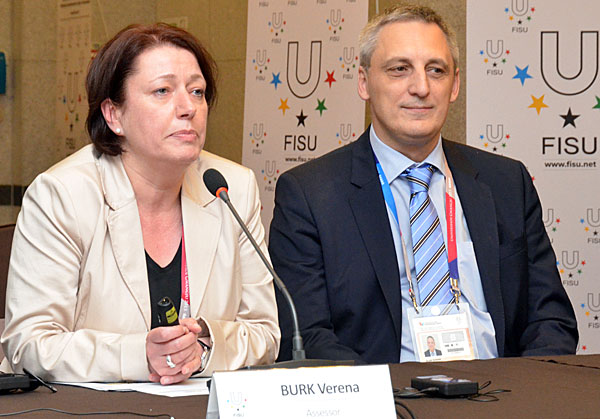 Verena Burk, Chair of the Media and Communication Committee with Dejan Susovic, FISU Media Director
Verena Burk, Chair of the Media and Communication Committee with Dejan Susovic, FISU Media Director
Finally, to conclude the day, Verena Burk presented the report of the Media & Communication Committee on TV viewing figures for the 2015 Winter Universiade, which were excellent. Ms. Burk also emphasized the new strategy to improve the visibility of FISU on social media and finally she presented the Young Reporters’ Programme which enters its third edition at the upcoming Gwangju Universiade. Once again, 12 young reporters from 5 continents will have the opportunity to experience the Games from within and gain a unique experience that will serve as a springboard for their future career. They will join 12 of their peers from Korea.
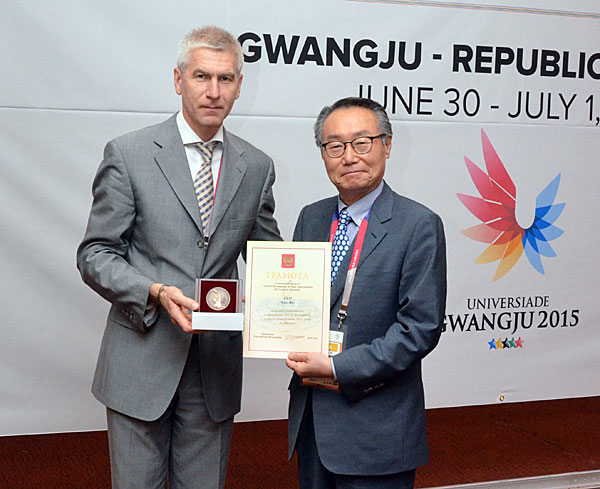 Oleg Matytsin, giving the diploma to Kim Chong Yang
Oleg Matytsin, giving the diploma to Kim Chong Yang
Note also that FISU 1st Vice-President Oleg Matytsin presented to the members of the Executive Committee a diploma signed by President Vladimir Putin in recognition of their involvement in the organisation of the successful 2013 Universiade which was held in Kazan.
The meeting continues tomorrow with the reports of the World University Championships as well as those of the next Universiades.
Text and pictures
Yvan Dufour, Editor in Chief
